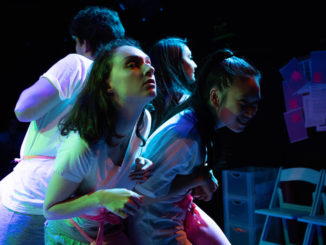
[Joy within Loss]
We enter with birdsong; she enters with silence. Twinless performer and creator Clare Marcie breathes out, reaches up, towards something above, something which we cannot hope to see. It’s a slow, weighted, and emotionally distanced opening—hardly a clue for the fun, vulnerable, and varied hour to come, and yet somehow, when viewed from the end of the show, it is perfectly poignant.
Twinless brings its audience deep into a transformative getaway, solo trekking through ‘second-hand memories and old documents’ in what looks like Clare’s family bach, while she explores her relationship with the too-brief life of her twin sister, Aisling. They spent 13 months together, Clare tells us, nine of those within the womb. In one hour, we experience a rich and nuanced foray into the dynamics of ambiguous loss, one which deepens as it stews in my memories. As director Harriett Maire notes, Twinless is a ‘complicated, delicious […] lasagne’ of labyrinthian layers. And lasagne gets better with age.
Within her bach, Clare acts out familiar mundane activities with an endearing, conspiratory energy—going for a morning swim and feeling smug about it, cleaning the room while sending little glances our way—while building up the courage to confront her memories (and lack of) surrounding Aisling. Interspersed throughout this storyline are dips into conversations between us and Clare, eerie physical theatre moments, documentary-like excerpts from the family home video collection, recorded conversations, and more, all integrated with and supported by Clare. She commands the stage in a way that feels friendly, charismatic, and gentle all in one. And it doesn’t hurt that she’s genuinely funny. When Clare is in scene, we are in her head, when she is addressing us, we’re her closest confidants. This casual likability only increases throughout the show.
At the beginning, Clare points out that she exists both in the past, writing her present words at the bach, as well as in the present, with us in the bach-like set. This parallels her position throughout the show, as she started somewhat distanced from the words, as if acting someone else’s lines. Then, the deeper we delve, the more real she becomes, turning the act of performing into one of sharing. Clare the writer chooses to give way to Clare existing now, making us active participants in the meaning-making process of her grief. It’s a subtle transformation which follows the arc of the story, so that by the time we reach the joyous climax, I feel like I’m sharing in the triumph of a best friend. Perhaps she shares her joy with us more easily than she shares her grief. Regardless, the blooming of her relationship with the audience adds immeasurably to the experience.
I was most impressed by the varied emotional beats of the play. It’s a testament to Twinless’ brilliant writing and devising that each one of the elements of the opening return later throughout the hour, transformed by what had transpired between them, every new bit of the show only ever adding to the previous—like when Clare cleans leisurely to Elvis Presley’s ‘Are You Lonesome Tonight’, and then again in desperation to his live recording, where he falls apart in hysterics. The piece is full of not-quite mirrored events, similar but distinct echoes—or, perhaps, twins.
That each of these scenes are visually and emotionally distinct from each other helps to give a sense of how complicated grief can be. The fluency between the performance and the tech design combines to achieve this. Projection fits neatly in with the detailed set, and the use of home video provides a whole other level of intimacy—being privy to something scarce and cherished. Lighting (Paul Bennett) offers clean, effective separation between scenes; lamplight, torchlight, and what seems like window light, are used to ground the duration of time spent in the bach. Immersive sound design (Philip Lawrence Jones) carries our emotions through Clare’s piece, and the music, at first seeming just an excuse for some gratuitous lip-syncing, surprises me in its eventual gravity and sincerity. When Clare dances to Peter Schilling’s ‘Major Tom (Coming Home)’, and it crescendos into the chorus while she flies around the stage, I lift off into euphoria with her.
But while the emotional peaks of the show pair with clamorous sound or deafening music to great effect, the volume of other moments seems dissonant with the action on stage. There is a disembodied voice (Ella Hope-Higginson) with which Clare interacts with repeatedly. I love this voice: I love questioning whether it is Clare’s monologue, or some sort of internalised voice-of-Aisling; love how it has its own range, pitying or bullying or comforting—but almost always it is too loud. At one point, I notice others in the audience acting on my impulse, which is to cover our ears. But with everything that Twinless gets right, it is a small issue, and one easily fixed.
A testament to the power of narrative in healing, Twinless exposes its laborious creation for us to see and appreciate. Every technical and dramatic element of the piece feeds into each other, so that what results is the sharing of a more honest and generous story of grief than any I have seen for a long time.
Twinless raises questions in me and answers them, and though the ending doesn’t feel resolved, I leave feeling full, satisfied, and uplifted. It really is a joyous, triumphant comedy—one in which the tragedy and ‘grief leaks out’, and enriches it. Clare seems to say: that’s loss. And that’s life.
Twinless plays Basement Theatre Studio 23-27 March, 2021.




Leave a Reply